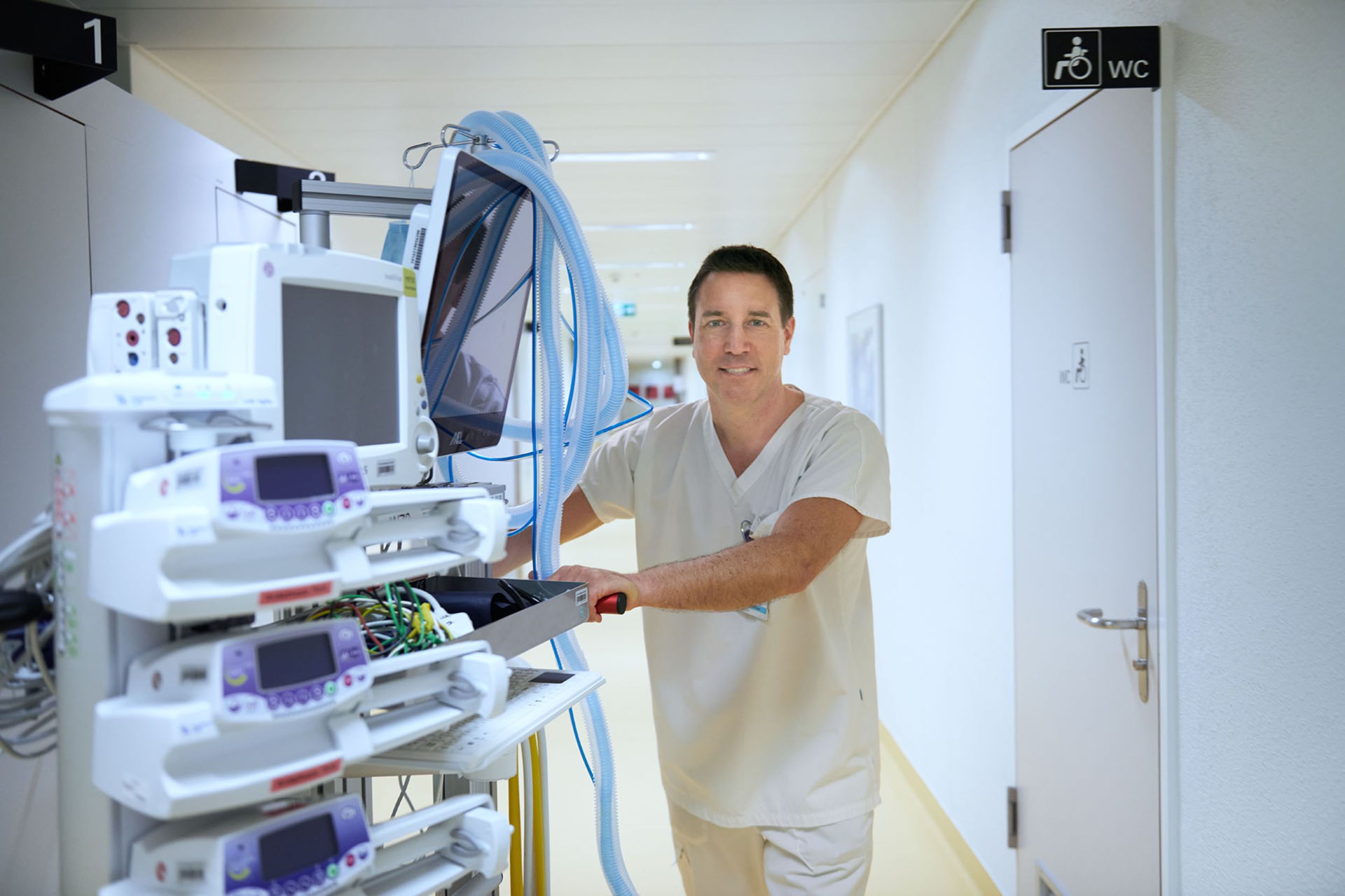
Offer
Our anesthesiology department consists of anesthesia, pain medicine and an intermediate care unit. We take care of you during operations, treat pain and look after patients who require special monitoring and care after operations. Many of our 350 employees are also involved in research and teaching.
The anesthesia
Anesthesia is responsible for providing high-quality care before, during and immediately after an operation. In collaboration with the OR management, the anaesthesia department is responsible for the optimal use of OR resources and the smooth running of all operating theatres at the University Hospital Basel. Every year, our staff care for more than 24,000 patients in all surgical and interventional specialties, from heart surgery to organ transplants and obstetric procedures. As a university hospital with a central function for the whole of Northwestern Switzerland, we treat a good 29 percent of all patients in an emergency intervention. Our service for patients is the result of a well-coordinated teamwork of doctors (anesthesia, surgery) and nursing staff (anesthesia, OR).
Anesthesiology office
Monday - Friday, 8.00 - 12.00 and 13.00 - 16.00
Tel: +41 61 265 72 54
anaesthesie@usb.ch
Operation/Intervention
The anesthesia department provides its services around the clock (365 x 24h). Surgical interventions are performed in 3 different operating theaters with 24 operating rooms. Our activities also include emergency interventions in the shock room and planned interventions outside the actual operating theaters. Our elective services are primarily focused on the following specialist areas: Breast surgery, vascular surgery, gynecology, obstetrics, ENT, heart surgery, cardiology, maxillofacial surgery, lung surgery, neurosurgery, orthopaedics and traumatology, plastic and hand surgery, urology, visceral surgery and spinal surgery.
Recovery room
As a monitoring and treatment unit, the recovery room offers 24-hour operation for the immediate aftercare of patients following an operation.
Acute Pain Service
Quality assurance
Our patients' opinions are important to us. That is why we have been asking many patients for years what was good at our clinic and where we can improve. This time-consuming quality assurance process is carried out by specially trained staff. A Critical Incident Reporting System (CIRS) developed by us helps us to continuously improve the safety of our services.
Anästhesie-Sprechstunde PAS
In der Anästhesiesprechstunde im Universitätsspital Basel werden ambulante und stationäre Patienten in einem Narkosevorgespräch auf eine Operation, eine Intervention oder eine Untersuchung in Narkose vorbereitet. In einem Gespräch wird individuell die beste Form der Narkoseart gemeinsam ausgewählt und bei Bedarf wird eine weiterführende Schmerztherapie mit etabliert.
Dank der Grösse des Universitätsspital Basel haben wir ein sehr breites medizinisches Angebot rund um die Uhr. Verschiedene Ärzte aus diversen Fachbereichen bringen gemeinsam ein enormes Wissen mit.
Bei komplexen Krankheitsgeschichten und Hochrisikoeingriffen wird eine interdisziplinäre Besprechung mit den Kollegen der Chirurgie, Anästhesie und den jeweiligen Spezialdisziplinen durchgeführt, um ein optimales und individuelles Management zu garantieren. Die Sicherheit und gute Betreuung des Patienten steht an erster Stelle.
Öffnungszeiten
8.00–16.30 Uhr
Anästhesie-Sprechstunde:
Universitätsspital Basel
Klinikum 1, Erdgeschoss
Spitalstrasse 21
4031 Basel
Tel. +41 61 265 41 41 (8.45 – 16.45 Uhr):
Fax +41 61 265 41 45

Dr. Saskia Semmlack
Oberärztin
Anästhesiesprechstunde

Dr. Andreas Lampart
Kaderarzt
Personalplanung AA
Interdisciplinary Intermediate Care Unit
The interdisciplinary Intermediate Care Unit (IMC or IMCU) is a monitoring ward responsible for the care of patients from surgical and medical disciplines. The IMC forms the link between the intensive care units and the departments/emergency. It treats patients with:
- an increased need for monitoring
- increased need for treatment due to single organ failure
- increased need for nursing care
Organization
A team of doctors from various disciplines and a nursing team specially trained for IMC care for patients around the clock. The IMC has 20 beds. Each patient bed is equipped with a monitor to closely monitor the heart rhythm, blood pressure and breathing and to treat them if necessary. Respiratory therapy equipment is also available; any kidney washing (dialysis) can be carried out directly on the ward.
Visiting hours
In addition to all the technology in cutting-edge medicine, the patient as a person is at the center of our thoughts and actions. Relatives can inquire about the patient's condition by telephone at any time.
Visiting hours are usually daily from 12.00-15.00 and from 17.15-20.00. Exceptions are possible after consultation with the responsible nursing specialist. Only two visitors can visit a patient at the same time. Visits by children under the age of twelve are only possible after consultation with the IMC team.
Visitors must register by telephone in the waiting area before entering the ward and will be collected afterwards.
Contact us
24h-Tel.: +41 61 265 74 40
Fax: +41 61 265 74 44
Sekretariat-IMC@usb.ch
Preclinical emergency medicine
Emergency patients are cared for and accompanied by a specially trained team from the street to the operating theater in the event of an accident or from home to the cardiac catheterization laboratory in the event of a cardiac arrest. The Department of Anaesthesia provides emergency medical care for regional emergency medicine in cooperation with the Basel-Stadt ambulance service and the Rega base in Basel; within the hospital, first aid is provided to patients in critical condition in cooperation with the emergency ward and the medical intensive care unit.
Seriously injured or life-threatening patients are cared for by the anaesthesiology emergency team together with the emergency ward team from the time they enter the shock room during initial assessment and stabilization in the emergency ward until they are treated in the trauma and emergency operating theatres or transferred to the intensive care unit.
The Swiss Center for Rescue, Emergency and Disaster Medicine(SZRNK) was founded following an initiative of the Swiss Society for Emergency and Rescue Medicine(SGNOR) and the Coordinated Medical Service(KSD) together with the University of Basel(UNIBAS) and the University Hospital Basel (USB). The SZRNK is structurally domiciled at the Department of Anesthesiology and associated with the University of Basel.
Pain medicine
General information
We treat patients who are affected by acute or chronic pain. The aim of our pain therapy specialists is to assess and treat patients as holistically as possible in their current life situation. The assessment and treatment is always based on a psychosomatic understanding of the illness. Whenever appropriate, this is done in conjunction with other disciplines. For example, we are an integral part of the pain consultation for children and adolescents with chronic pain.
The outpatient consultation is open to all patients affected by pain. Another important task for our therapists is the care of patients suffering from acute pain after operations. In addition to the use of medication and psychological support, we also consider the use of minimally invasive, interventional pain management methods. This involves the use of so-called pain catheters. Ideally, such a pain catheter provides absolute freedom from pain. In addition, this often means that systemic pain therapy (tablets, injections) is no longer absolutely necessary, which is why there are no corresponding side effects.
For cancer patients with severe tumor pain, drug or interventional minimally invasive therapy should be considered. Particularly for patients in the palliative phase, pain therapy can contribute to an impressive improvement in the situation for the patient, but also for relatives and caregivers. Such measures can enable longer care at home and be an important element in fulfilling the patient's wish to be able to die at home.
The acute pain service is the pain service responsible for the round-the-clock care of inpatients for whom conventional post-operative pain therapy is inadequate. As a rule, these patients receive invasive continuous pain therapy or the option of self-referral of pain medication.
We also offer a mobile pain service for palliative patients and patients with severely restricted mobility. We provide advice in difficult and complex pain situations and also carry out home visits in Basel-Stadt if required. Our service is very comprehensive and includes a broad spectrum of pain therapy for oncology patients. This service is made possible in cooperation with the Onkospitex of Spitex Basel.
Contact us
Registrations must be made via the attending physician.
Please note that longer waiting times are to be expected due to the high demand.
Information for referring physicians
Pain medicine office:
Opening hours:
Monday to Friday:
8.00 to 12.00 / 13.30 to 16.00
Phone +41 61 265 40 37
Fax +41 61 265 57 20
schmerzmedizin@usb.ch
Location University Hospital Basel:
Our offices are located in building K1 (entrance Spitalstrasse), first floor.
If you have any difficulties on site, please do not hesitate to ask the staff at the reception desk.
Bethesda Hospital site:
Our premises at the Bethesda Hospital site (Gellertstrasse 144) are located on the second floor.
The reception staff on the first floor will be happy to help you find your way around.
